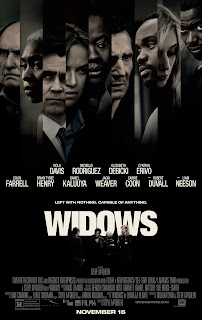 |
| Widows film poster. |
 |
| Jamal (Brian Tyree Henry) threatens Veronica (Viola Davis) and her little dog too. |
Now Widows deliberately celebrates white desirability in ways that could mentally harm and damage a black psyche. Alice, the youngest, calls Veronica a bitch and a cunt and even slaps her. Meanwhile, Alice's mother is ten times worse. She doesn't undermine her mother face to face. However, she treats a complete black woman stranger like the enemy. She is supposedly too broken and shattered, a woman treated objectively. Yet it is this black woman that she can fully launch unrepressed venom and hatred.
 |
| Too little, too late: Veronica (Viola Davis) seems to live for white compassion, i.e. Alice (Elizabeth Debicki). |
Veronica and Harry seem to have the perfect life-- her being a teacher and him being a criminal and all-- but it turns out to be terrible fiction. They play up the background Nina Simone ballad reminding the audience that this sultry magnificent singer with prominent African features and dark ruddy skin had also married a white man. Harry and Veronica's teenage son dies in a twisted, unbelievable cop narrative that just harms true American reality. This catalyst drives them apart, leaving Harry to cheat and make a white on white baby. At the end of the day, white was right and safe for Harry. To worsen matters, backstabbing Harry-- who turns out to be alive and well-- is quick to point a gun at Veronica after she pulls off a finicky heist with Harry's own handwritten instructions. A real win for the interracial love marketing team.
Thus, the black women depictions were not kind, lacking genuine tenderness and care. Belle is introduced to Veronica as the driver. They attack each other without reason. The only scene they are alone together, the two women have no dialogue. As if McQueen's camera artfully focusing on their gazes at one another is enough. Well, it's not. It's lazy. In one unnecessary scene, the slender, muscled Belle beats a punching bag like she's Rocky. Again, she's just the driver. Yet also a single mother, she spends more time with Linda's kids than her own-- an indentured servant role, the black mother nursing white babies, or in Belle's case Latinos. She barely shows affection to her daughter. Whereas, Veronica, the older woman, mother hens everyone. Other than distracting flashbacks with Harry, she has no purpose beyond obtaining Jamal's money.
 |
| Veronica (Viola Davis) leads the three: Linda (Michelle Rodriguez), Belle (Cynthia Erivo), and Alice (Elizabeth Debicki). |
Widows is especially insensitive to the needs of black women film viewers, demonstrating by story and imagery a glaring disrespect that is calculative and deceitful. This painful illustration is not at all as intelligent as the trailer disguises itself to be.
Other than that, Adepero Oduye deserves better than this.
Wow, I feel like I need to go back and watch the movie again because I thought it was an interesting movie and I think they did do a good job of talking about the racial and class differences in Chicago. I do agree that Elizabeth Debicki was pretty bad and I am not sure why I am seeing articles talking about how she “stole” the movie. (Lol what) But I thought the movie was about grief, and specifically Veronica’s grief, and how no one — not the other widows, and certainly not her husband— were capable or willing to accept how much she was affected and how deep of a betrayal she suffered. She was someone who was in a tremendous amount of pain but no one wanted to see her that way. At least that is how I interpreted it. I felt a tremendous amount of empathy for her. And it felt like Chicago was another character to me. I keep thinking of that tracking shot as Jack leaves the minority women empowerment rally (heh) and we follow along as the car leaves Bronzeville to the Kenwood mansion where he lives, as he reveals his true feelings about Black people while his Black driver is in the front seat, silent. I thought that kind of said it all.
ReplyDeleteThank you for your thoughtful comment, Danielle. I agree about Veronica. I also truly felt the most empathy for her. She was the most isolated, having just the dog for consolation. No one wanted to comprehend or address her pain-- the pain of loss, the fear from Jamal, the double betrayal from her husband. In fact, I think she had the better character development. The driver scene ( significantly shot in the avant garde fashion) did have power, but weaknesses overwhelmingly stuck out. There were too many unnecessary Elizabeth Debicki scenes, Cynthia Erivo and Michelle Rodriguez were grossly underutilized, and though I appreciate the Chicago landmarks, it didn't feel genuine.
Delete